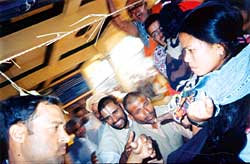 The action by Dalits in Bharatpur on Sunday to gain legal entry into a temple and the ensuing violence against them by police and vigilantes held deep significance to Dalits here who continue to be denied entry into Hindu temples across Nepal.
The action by Dalits in Bharatpur on Sunday to gain legal entry into a temple and the ensuing violence against them by police and vigilantes held deep significance to Dalits here who continue to be denied entry into Hindu temples across Nepal.
The events followed the expensive and contentious International Consultation on Caste-Based Discrimination in Kathmandu last week and highlighted the tenuousness of the human rights situation of Dalits in Nepal. Prepared with legal permission to enter the Laxmi Banketesh temple in Bharatpur, a Dalit joint action committee had gained permission from the temple management committee to enter the premises. The stage had been set for what was intended as a peaceful and legal temple entry movement.
Instead, what the Dalits encountered on Sunday in Bharatpur could best be described as an intimidating environment where some individuals appeared to be more prepared for conflict and violence than for tolerance. Although the police had been adequately informed about the planned social action, they were remarkably ill-prepared for crowd control, peaceful protest and conflict mediation.
The procession to the temple was led by a young Dalit woman who was to perform a ritual inside the temple that hundreds and thousands of Hindu women perform every day. Carrying a simple bouquet of flowers, she had a simple aim: perform a puja to the deity inside the temple.
 She is Hindu by birth but had never been allowed to perform this ritual that so many take for granted. When she and the Dalit procession leaders arrived at the temple entrance, they were denied entry. The 30 or so priests seated inside the gated entrance were themselves engaged in a puja surrounded with beautifully arranged flowers and vermillion. Grasping the metal gate and the metal bars around the temple, the Dalits appeared to be jailed both from without and within.
She is Hindu by birth but had never been allowed to perform this ritual that so many take for granted. When she and the Dalit procession leaders arrived at the temple entrance, they were denied entry. The 30 or so priests seated inside the gated entrance were themselves engaged in a puja surrounded with beautifully arranged flowers and vermillion. Grasping the metal gate and the metal bars around the temple, the Dalits appeared to be jailed both from without and within.  When they were denied entry, the Dalits tried to forcibly enter the temple. Passions ran high and many entered the temple by climbing over metal bars or forcing their way in through the metal gate. Things quickly spiralled out of control and a police lathi charge ensued. Caught in the charge, many were trampled and unnecessarily beaten both by police latthis and butts of guns.
When they were denied entry, the Dalits tried to forcibly enter the temple. Passions ran high and many entered the temple by climbing over metal bars or forcing their way in through the metal gate. Things quickly spiralled out of control and a police lathi charge ensued. Caught in the charge, many were trampled and unnecessarily beaten both by police latthis and butts of guns.
The Dalit procession fled and as they regrouped to attempt further negotiations with the temple management committee, a group of vigilante youths rushed at those who had gathered outside the temple area, hurling stones. A barrage of bricks and rocks split heads and injured many. Those fleeing this attack in many cases were denied even temporary shelter in local homes. The police did nothing to protect the Dalits from this unrestrained attack. When they did act, it was a little too late to pursue the vigilantes.
At that point, the Dalit leaders gathered their followers and led a procession away from the area which wound its way back towards Sahid Chok in Narayangad. Even here, the army's lumbering mine-protected vehicles cleaved through the procession and effectively silenced the Dalit's chants.
Back in Kathmandu, at the closing ceremony of the International Consultation on Caste-Based Discrimination, Minister for Local Development, Yuba Raj Gyawali reiterated the government's commitment to the Universal Declaration of Human Rights and the International Convention on Eradication of All Forms of Racial Discrimination. High level representatives from multilateral and donor agencies as well as international human rights advocates proclaimed solidarity with the Nepali Dalit communities. Indeed, there are many who do work in solidarity with Nepali Dalits and care deeply about human rights across the world.
But even at this historically important consultation, many Dalit groups felt marginalised and excluded. The events of 5 December made a mockery of the rhetoric shared at the consultation. Practices of untouchability, social exclusion, caste-based discrimination and violence are not just rhetorical subjects but painful realities tragically borne by Dalit communities struggling for respect, humanity and freedom.
Laurie Ann Vasily is working on her PhD at Cornell University whose current research focuses on Nepali Dalit adult education issues.


